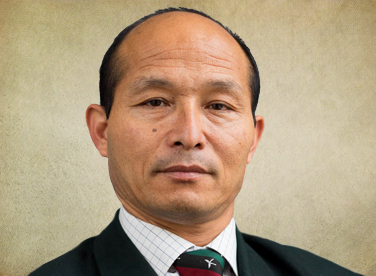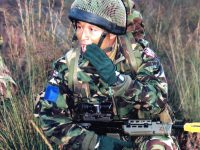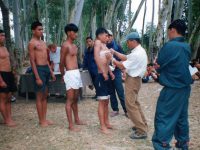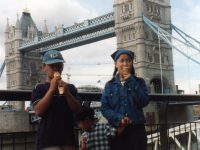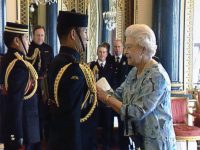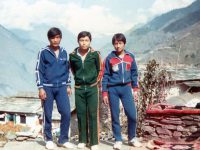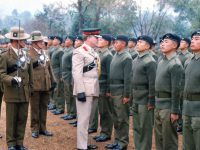Capt. (Ret’d) Umesh Kumar Pun, MVO
Capt. (Ret’d) Umesh Kumar Pun, MVO
(Portrait © Gurkha Voices Oral History Project)
-
Training exercise
-
Recruitment candidates
-
Family holiday
-
MVO, 2007 (Courtesy of BCA)
-
Umesh (centre) & brothers
-
Inspection
-
Audio 1
-
Audio 2
-
Audio 3
Umesh achieved his boyhood dream of enlisting in the Gurkhas in 1979 at the age of seventeen and a half. After many years of promotion through the enlisted ranks he was commissioned as an officer. Umesh served as the Queen’s Gurkha Orderly Officer in 2006-07 and retired in 2010 after three tours in Afghanistan.
He also specialised in jungle warfare, becoming an expert training instructor, based in Brunei.
Umesh has been deployed to Afghanistan three times and trained the Afghanistan army on behalf of NATO. He has served on peacekeeping missions in Bosnia and trained the army of Sierra Leone on his second posting there after being deployed to repel the West Side Boys rebel force.
Now retired, Umesh lives in Colchester with his family and runs a local pub and Gurkha restaurant. He is also co-founder of Abbeygate House, the Gurkha Homes Project, which houses 26 retired Gurkha veterans in Colchester. Umesh dedicates his time to helping the retired Gurkhas and Nepalese community in Colchester and running his restaurant business with his three brothers.
He is still an active member of the Armed Reserve (formerly called the Territorial Army) deployed on regular training exercises across Europe and the UK each year.
At the time of writing this, two days after the April 2015 earthquake devastated Nepal, Umesh flew out as a volunteer to help with the rescue and clear up operations and is currently still there.
Umesh’s interview audio extracts are accompanied by the transcripts below and he features in our short film on our website by clicking here.
(More of Umesh’s stories are in our book, published later this year. Keep posted via our blog: www.gurkhastories.wordpress.com)
Umesh Kumar Pun's interview transcriptions:
Audio 1 (2 mins)
So I came to Pokhara, have a selection, same as other boys, everyone desperate, want to join. Because the way I seen the Gurkhas in the village they got the money, they got the clothes, the way their lifestyle. I remember my recruiting directing officer, JP Cross, so when I sit down face to face with him, he asked me a question, “Which village do you come from?” Then I said, “Shikha.” He know very well about Shikha. I feel quite comfortable because he talking about my relatives. Then he asked me, “Can you show me your hand?” Then I show my hand. I didn’t know why he asking that. Normally village people, because of we working hard, so we used to have the mark in the hand, callus, yes.
At the end he said, “Right,”, he didn’t say my name, he said, “Chora,”, Chora means son. He always call everyone son, okay? So he said, “Right son, on the night you born, don’t know what’s written in your forehead, it’s covered by skin, so we don’t know anything. And then he said, “Do not discuss this thing between son and father. So off you go.” So that’s it, they finished my interview with him.
Result day, we all line up. They don’t call by name. Everything to do with the chest number, because that’s fair. Otherwise if they say name and their caste, probably whoever instructor stop there, they–, favouritism, that kind of thing. We were so nervous whether my chest number come up or not. So I remember right in front of me was my friend, his name is called out. Then he jump and run. The next one coming [is my] number. That is the only thing I remember, okay? We are overjoyed, over the moon, success!
Audio 2 (2 mins 35 secs)
When it first kicked off in Sierra Leone, so I was actually attached with the A Company. I remember during the patrol it was really hot. I said to my platoon, “Anything happen, everyone be prepared.” So we all prepared everything ready. So we were patrolling quite long.
So everywhere we go, the Sierra Leone locals really welcome us, clapping everywhere. So we just asking, “Is there any bad guys or West Side boys?” They said, “Oh no, no, everyone gone, everyone gone.” So we’re just patrolling.
My platoon was quite distant from the airport. Then I got radio call, I need to [go] back to airport as quickly as possible. Then basically we’ve been told we need to defend around the airport. So we start to dig out our trenches, the area where I’ve been given. So my eight platoons, the other seven platoons, then early evening we get the [all group]. Intelligence suggest maybe West Side boys coming, attacking us from this direction or that direction. So basically we just try to protect the airport everywhere. Then once we settle, then we’ve been told to go further distance. So we use the Chinook helicopters to jump in the middle of nowhere, where we’re patrolling everywhere, trying to make sure all the quiet, no any bad guys around there. So we make sure it’s reassurance for the village people, the local people, we are here, don’t worry.
Audio 3 (1 min 42 secs)
We done a lot of different things. We build the school, because of all the school was burned down or, you know, whatever. So we build the schools, we paint the schools. Basically [the] Stabilisation Support Group is to win the heart and mind, local people, helping them [with] school, mosque. Most of time their local people want to buy loudspeaker to put in their mosques to make loud prayer.
So that was our job. And always I was carrying the big Afghani money on my day sack while the others carrying a lot of ammunitions. Then we patrolling round, we go there; then when they put the problem, then I will assess.
Most of time, when we patrolling, we have to climb up their roof, because all the Afghani roof are mud-made so it’s going to be damaged when the soldiers walking up on the roof, because we have to there to look at the snipers or look at the bad people. So when they climb up, they damage. So when that damaged, they need to repair it. So we are the one who assess, okay, that much money needed. So we take the photograph, taking the money, sign the paperwork, hand over the money, make them happy, then leave that place, then we move onto other place. A lot of kind hearted British public donate a lot of children’s toys, clothes, that kind of things, is coming to our place, so we used to distribute that to them. So we can see their face, they are happy.
What province was this? Helmand? This is Helmand.
Oral histories: © Gurkha Voices Oral History Project

